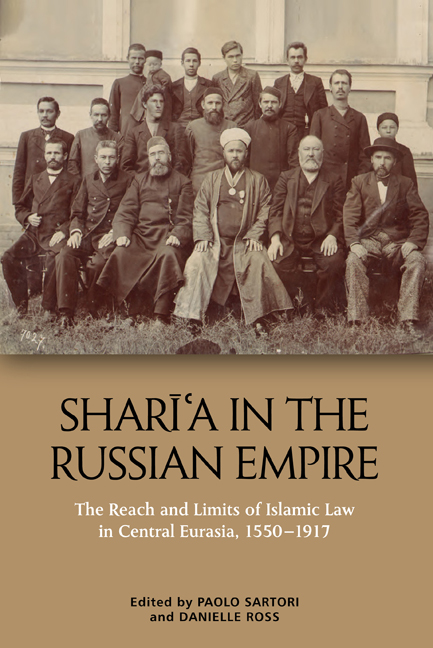Book contents
- Frontmatter
- Contents
- List of Contributors
- Introduction: The Reach and Limits of Sharīʿa in the Russian Empire, c.1552–1917
- 1 Islamic Education for All: Technological Change, Popular Literacy and the Transformation of the Volga-Ural Madrasa, 1650s–1910s
- 2 Taqlīd and Discontinuity: The Transformation of Islamic Legal Authority in the Volga-Ural Region
- 3 Debunking the ‘Unfortunate Girl’ Paradigm: Volga-Ural Muslim Women’s Knowledge Culture and its Transformation across the Long Nineteenth Century
- 4 Between Imperial Law and Islamic Law: Muslim Subjects and the Legality of Remarriage in Nineteenth-century Russia
- 5 Islamic Scholars among the Kereys of Northern Kazakhstan, 1680–1850
- 6 Tinkering with Codification in the Kazakh Steppe: ʿĀdat and Sharīʿa in the Work of Efim Osmolovskii
- 7 Taqlīd and Ijtihād over the Centuries: The Debates on Islamic Legal Theory in Daghestan, 1700s–1920s
- 8 Kunta Ḥājjī and the Stolen Horse
- 9 What We Talk about When We Talk about Taqlīd in Russian Central Asia
- 10 Take Me to Khiva: Sharīʿa as Governance in the Oasis of Khorezm (Nineteenth Century–Early Twentieth)
- Index
4 - Between Imperial Law and Islamic Law: Muslim Subjects and the Legality of Remarriage in Nineteenth-century Russia
Published online by Cambridge University Press: 22 September 2020
- Frontmatter
- Contents
- List of Contributors
- Introduction: The Reach and Limits of Sharīʿa in the Russian Empire, c.1552–1917
- 1 Islamic Education for All: Technological Change, Popular Literacy and the Transformation of the Volga-Ural Madrasa, 1650s–1910s
- 2 Taqlīd and Discontinuity: The Transformation of Islamic Legal Authority in the Volga-Ural Region
- 3 Debunking the ‘Unfortunate Girl’ Paradigm: Volga-Ural Muslim Women’s Knowledge Culture and its Transformation across the Long Nineteenth Century
- 4 Between Imperial Law and Islamic Law: Muslim Subjects and the Legality of Remarriage in Nineteenth-century Russia
- 5 Islamic Scholars among the Kereys of Northern Kazakhstan, 1680–1850
- 6 Tinkering with Codification in the Kazakh Steppe: ʿĀdat and Sharīʿa in the Work of Efim Osmolovskii
- 7 Taqlīd and Ijtihād over the Centuries: The Debates on Islamic Legal Theory in Daghestan, 1700s–1920s
- 8 Kunta Ḥājjī and the Stolen Horse
- 9 What We Talk about When We Talk about Taqlīd in Russian Central Asia
- 10 Take Me to Khiva: Sharīʿa as Governance in the Oasis of Khorezm (Nineteenth Century–Early Twentieth)
- Index
Summary
Introduction
Although the Russian state left the arbitration of family matters, such as marriage and divorce, to the jurisdiction of the religious law of every community in the empire, the nineteenth-century laws and regulations aimed at better integration and control of the population turned the previ¬ously intra-communal issues of marriage and divorce into imperial issues. These legal changes created new challenges for the Muslim women and the Muslim community of the Volga-Ural region. The issue of divorce and remarriage in the case of a husband's exile proved to be especially problematic. The prevalent school of Islamic law in the region – the Ḥanafī school of law – did not grant divorce to women whose husbands went missing or absent (mafqūd), but legal experts in the Volga-Ural region had found interpretations to circumvent this legal obstacle before marriage and divorce became imperial issues. I argue that the new laws on exiles and their wives were a part of state policy to further integrate Muslim subjects into the empire, but they created social problems that had larger socio-religious and ethical implications for the Muslim community. Looking at petitions of Muslim women to the Orenburg Muslim Spiritual Assembly (hereafter, the OMSA) I explain the consequences of these legal changes and explore how Muslim religious scholars and the OMSA tried to cope with them.
On 5 December 1852, a resident of the village of Novoe Arslanovo of Troitskii uezd, Khalilzada Kalkamanova, wrote to the Tsar asking to dissolve her marriage and to allow her to marry a person of her choice. She wrote that the Military Court Commission of the Orenburg Military Battalion (Komissiia voennogo suda pri orenburgskom voennom batal’one) tried her husband, Muhamedsharif Bazekeev, for several crimes and sentenced him to exile in Siberia for settlement (na poselenie). Since she did not have any material support from her husband she was staying with a relative and intended to marry another man. However, the maḥalla imam of Novoe Arslanovo, Gatikam Araslanov, had to get permission from the OMSA to perform the second marriage and therefore ‘did not dare’ to do it. The OMSA contacted the Military Court Commission and received a letter of confirmation that Muhamedsharif Bazekeev was sued for robbery and other crimes, and that on 19 August 1850 he was sentenced to 300 lashes and was exiled to Siberia for settlement.
- Type
- Chapter
- Information
- Shari'a in the Russian EmpireThe Reach and Limits of Islamic Law in Central Eurasia, 1550-1917, pp. 156 - 182Publisher: Edinburgh University PressPrint publication year: 2020



